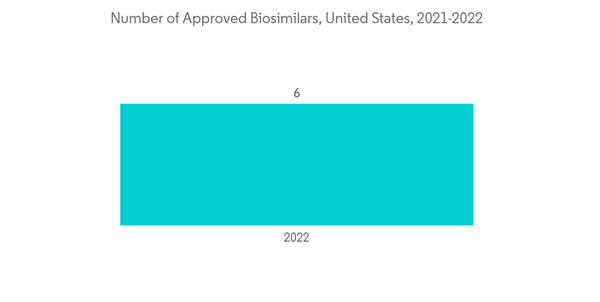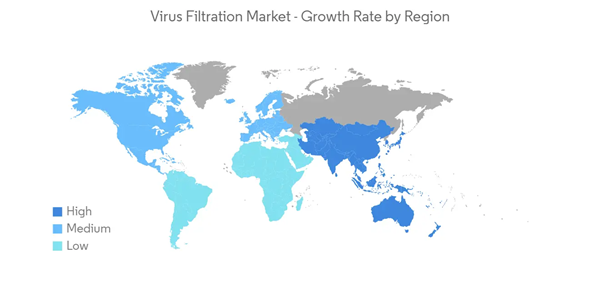The outbreak of COVID-19 worldwide is expected to show a positive impact on the market because sterilization is crucial for the removal of all microbes, such as bacteria, fungi, viruses, and protozoa, which may contaminate medicinal drugs, vaccines, or alternative substances, and thereby, present health hazards. In a hospital burdened with COVID-19 patients, the SARS-CoV-2 virus was successfully removed from the air using portable air filters, according to a study published in Springer Nature Limited in October 2021. The findings suggested that air filters may decrease SARS-CoV-2 infection risk among hospital patients and personnel. It can thus be concluded that the demand for virus filters increased significantly during the pandemic.
Initiatives such as investing in a new facility for biopharmaceutical drug development for COVID were key factors in market growth. Such facilities require virus filtration during drug development to maintain their sterilized condition. For instance, Clean Cells invested USD 15 million in a new manufacturing facility in Montaigu-Vendée in September 2021. The business, supported by healthcare investment fund ArchiMed, aims to play a significant part in accelerating the development and time-to-market of innovative COVID-19 medicines and vaccines by quadrupling its analysis and production capacity for biopharmaceuticals.
A few other factors that can be attributed to the growth of the virus filtration market are increasing R&D spending, increasing demand for biologics, and the adoption of single-use technologies. Increasing investment by public and private organizations for drug development is another boost for the market as such investments increase the number of clinical trials and production of drugs that require virus filtration to keep the final drug pure. According to a November 2021 update, the federal government has allocated USD 5.8 million to fund attempts to eradicate cervical cancer in Australia by 2035. By the end of 2022, a National Cervical Cancer Elimination Strategy would be developed with the assistance of the financing provided to the Australian Centre for the Prevention of Cervical Cancer (ACPCC). The government will also utilize the funds to support Compass, Australia's largest clinical study of its kind, which looks at the connections between the HPV vaccine and HPV screening.
Several market players are engaged in the implementation of strategic initiatives such as investment for innovative biologic development which require virus filtration. In February 2021, Hangzhou Sciwind Biosciences Co. Ltd (Sciwind), a clinical-stage biopharmaceutical company, received USD 37 Million Series B financing from LYFE Capital to accelerate the research and development of innovative biologics in the therapeutic area of chronic metabolic and immunological diseases. Similarly, in July 2021, AbbVie expanded its global operations in the United States for contract manufacturing (CMO) and end-to-end capability for CMO clients. However, stringent regulations on the validation of filtration products are expected to hinder the market growth.
Viral Filtration Market Trends
The Vaccines and Therapeutics Segment is Expected to Hold a Majority Share of the Market Over the Forecast Period
Vaccines and/or therapeutics are made from the disease's active ingredient, its byproducts, or a synthetic equivalent. They are employed to increase antibody production and offer immunity from one or more diseases. Due to factors including industry participants' increased R&D efforts to develop ground-breaking vaccines or medicinal pharmaceuticals, the market is expected to grow over the projected period. The R&D and production of such drugs and vaccines require some sort of virus filtration to be in a sterilized condition. For instance, in July 2022, Genome Valley, a Hyderabad-based vaccine manufacturer, and Biological E. invested USD 22.7 million (INR 1,800 crore) on expansion projects at three of its sites. Its main purpose was to increase vaccine production, generic injectables, and research and development (R&D) of various vaccinations, including tetanus.Further, in March 2022, the International Vaccine Institute (IVI), in collaboration with LG Electronics, the Ethiopian government led by Armauer Hansen Research Institute (AHRI), and the Ethiopian Public Health Institute (EPHI), reported vaccination of 40,000 people against cholera to support the prevention of the disease in Ethiopia. Additionally, in August 2022, GSK was given a contract by UNICEF for the supply of a malaria vaccine with a potential value of USD 170 million. 18 million doses of RTS, S/AS01 (RTS, S) will be made available over the following three years as a result of the historic grant, potentially saving countless lives every year. Such initiatives as investments and grant approvals are likely to increase segmental growth and are expected to increase the adoption of virus filtration over the forecast period.
North America Dominates the Market and is Expected to Continue Over the Forecast Period
North America is expected to hold the largest share of the overall market throughout the forecast period. This is due to the increasing investments and the presence of more pharmaceutical companies in the region. The United States holds the largest market share in the North American region. Initiatives such as partnerships by key regional players are one of the factors in market growth during the forecast period. For instance, in July 2022, the new large-scale plant-based protein facility for EverGrain in St. Louis, Missouri, received its filtering solution from Pall Corporation. With the Pall Membralox Microfiltration System, EverGrain's new factory concentrates on upcycling the brewer's saved grains. Previously utilized as animal feed, the refined high-functional protein can now be transformed into wholesome, plant-friendly components for other food products. Such a partnership is expected to provide advanced products in the region, increasing market growth.Grant support for investing in facilities is another factor in market growth. For instance, in July 2021, Gilead Sciences Canada, Inc. stated that the 2021 CONNECT-C Grant Program was received by Omega Specialty Nurses (OSN) House of Sophrosyne and the Viral Hepatitis Care Network in Ontario to increase hepatitis screening facilities in the country.
Further, Ford released an air filter system in March 2021 that can be put together at home or in a classroom to protect against COVID-19. A 20-inch Lasko box fan, a 20x20x4-inch air filter, and an easy-to-assemble die-cut cardboard base make up the air filtration kit known as Scrappy Filtration, which Ford's Project Apollo team developed to combat COVID-19. This is one of the most affordable ways to protect against COVID which can be used by communities across the globe. Innovative product launches such as these are expected to boost market growth during the forecast period.
Viral Filtration Industry Overview
The virus filtration market is moderately competitive and consists of several major players. In terms of market share, few major players currently dominate the studied market. With the rising R&D of biopharmaceutical companies and the high prevalence of diseases, few other smaller players are expected to enter into the market studied in the coming years. Some of the market's major players studied are Asahi Kasei Medical Co. Ltd, Charles River Laboratories International Inc., Qiagen, Pall Corporation, and Merck KgaA, among others.Additional Benefits:
- The market estimate (ME) sheet in Excel format
- 3 months of analyst support
This product will be delivered within 2 business days.
Table of Contents
Companies Mentioned (Partial List)
A selection of companies mentioned in this report includes, but is not limited to:
- Asahi Kasei Medical Co. Ltd
- Charles River Laboratories International Inc.
- Clean Cell Inc.
- Danaher Corporation (Pall Corporation)
- Lonza Group Ltd
- Merck KgaA
- PendoTECH
- Qiagen
- Sartorius AG
- Thermo Fischer Scientific Inc.
- Wuxi Biologics










